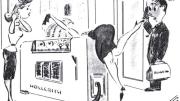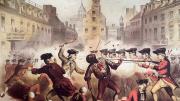The Crucible of Islam, by G.W. Bowersock ’57 (Harvard, $25). The staggeringly learned professor emeritus of ancient history at the Institute for Advanced Study provides a brisk, succinct, and bracingly clear account of the chaotic conditions in sixth-century Arabia, where Muhammad’s message took root—amid intersecting empires and contending Christianity, Judaism, and polytheistic beliefs.…The faith that spread from those origins is, as Cemil Aydin, Ph.D. ’02, makes clear in The Idea of the Muslim World (Harvard, $29.95), now followed by 1.5 billion people worldwide who are anything but unitary in their national, political, and cultural identities. The sooner other humans around the planet understand that, the better.
A Meeting of Land and Sea, by David R. Foster, senior lecturer on biology and director of the Harvard Forest (Yale, $40). A beloved, high-end island retreat/resort, Martha’s Vineyard is also endangered: it is “disappearing,” Foster notes, as climate change accelerates erosion, and being consumed from within by rapid development. A comprehensive natural and cultural history, and a guide for conservation. Sumptuously illustrated.…Meanwhile, back at the Harvard Forest, Seattle Times environmental reporter Lynda V. Mapes tells a similar story, subtly, in Witness Tree: Seasons of Change with a Century-Old Oak (Bloomsbury, $27). She observes well, beginning with the “garage band of trees, talking back” as their trunks, in distinct timbres, resisted curious scientists’ hand-turned coring tools, extracting the story embedded in each bole.
The Corruption Cure, by Robert I. Rotberg (Princeton, $35). The former director of the Kennedy School’s program on intrastate conflict and conflict resolution conducts a searching, global review of the graft and rot that undercut public and business institutions—“the harsh political disease of our era”—and points to the cleansing effects of civil society and, where available, capable leadership.
The Fact of a Body: A Murder and a Memoir, by Alexandria Marzano-Lesnevich, J.D. ’05 (Flatiron, $26.99). As the subtitle suggests, the author’s notions about the death penalty abruptly confront the facts of a murder case, and, at a deeper level, her unexcavated family history.
One Nation Undecided, by Peter H. Schuck, J.D. ’65, A.M. ’72 (Princeton, $29.95). The author, now emeritus from Yale Law School, presumably having begun this long book before the advent of “fake news,” proposes “clear thinking about five hard issues that divide us” (the subtitle). In an era of “woefully deficient” public debate and public-policy disputes that have become “more protracted, more impervious to reasoned debate,” he offers fresh perspectives on poverty, immigration, campaign finance, affirmative action, and religious freedom. A welcome contribution, especially when the current forms of discourse fall out of fashion.
Singapore: Unlikely Power, by John Curtis Perry, Ph.D. ’62 (Oxford, $29.95). The author, professor of maritime history at Tufts University’s Fletcher School, traces the city-state’s ascent in terms of geography (at the neck of the Straits of Malacca), history (British governance, clearly separated from local commerce), and (of relevance at the current moment) coexistence among a radically heterogeneous mix of resident nationalities and ethnicities.
My Father & Atticus Finch, by Joseph Madison Beck, LL.B. ’68 (W.W. Norton, $25.95). An Atlanta attorney mines the family history to reconstruct the role of his father (“a real Alabama lawyer”) in State of Alabama vs. Charles White, Alias, representing a black man who had been arrested and charged with raping a white woman—a trial that took place when Harper Lee was 12.…A very different life appears in Fake Smiles: A Memoir, by Tony Rogers, J.D. ’66 (TidePool Press, $26.95). An antiestablishment son’s growing up with an establishment father, William P.—attorney general and secretary of state, respectively, in the Eisenhower and Nixon administrations (“I could safely bet I’d be the only cab driver whose father was secretary of state”).
Adaptive Markets: Financial Evolution at the Speed of Thought, by Andrew W. Lo, Ph.D. ’84 (Princeton, $37.50). The author, of MIT’s Sloan School, observes that “financial markets don’t follow economic laws.” Fear and emotion undercut the rational assumptions of efficient markets, prompting him to explore at length biological, evolutionary, and adaptive models—a major challenge to the prevailing worldview.
The Murder of Willie Lincoln, by Burt Solomon ’70 (Forge Books, $25.99). A reimagining, in fiction, of the death that further darkened Abraham Lincoln’s White House during perhaps the darkest days of the early Civil War.
North Korea’s Hidden Revolution, by Jieun Baek ’09, M.P.P. ’14 (Yale, $30). Tapping her contacts with defectors, the author explores the emerging “information underground” that is, she says, opening perhaps the world’s most closed society. Given recent developments—missile tests, the murder of the leader’s relative outside the country’s borders—one hopes she is right.
Barney, by Michael Rosenthal ’58 (Arcade, $24.99). Rosenthal, an emeritus English and comparative literature scholar at Columbia, has undertaken the biography of a champion of unpopular literature: Barney Rosset, of Grove Press and Evergreen Review, who fought the legal battles to publish Lady Chatterley’s Lover and Tropic of Cancer. (Later transgressions included distributing I Am Curious Yellow.)
The Age of Responsibility: Luck, Choice, and the Welfare State, by Yascha Mounk, Ph.D. ’15, lecturer on government (Harvard, $29.95). In an age of workfare and other efforts to tie social, public assistance to personal, individual “responsibility” or worthiness, the author thinks through the consequences for equity, what were presumed to be common values, and the terms on which we are all going to plan to live together.…At the same time, as Jonathan Morduch, Ph.D. ’91, and Rachel Schneider document in The Financial Diaries: How American Families Cope in a World of Uncertainty (Princeton, $27.95), it is harder than ever to be “responsible,” even for those with the training to do so, given contingent and outsourced jobs, self-managed retirement plans, and pervasive economic volatility. Revealing data based on current families’ narratives of their straits.
Read My Lips: Why Americans Are Proud to Pay Taxes, by Vanessa Williamson, Ph.D. ’15 (Princeton, $27.95). The subtitle may appear to overreach, but the author has looked beyond the headline hatred of paying taxes to “attitudes about public spending,” giving lie “to the notion that Americans are knee-jerk opponents of government.” Useful background, perhaps, at a moment when doing in the Affordable Care Act is proving to be more than a click of the heels.
Tinker Dabble Doodle Try, by Srini Pillay, part-time assistant professor of psychiatry (Ballantine, $28). All those exhortations to focus? The author, who is also an executive coach, urges you to junk that “cult,” creating space to “unlock the power” of mindless (but strategic) wandering—the fount of creativity and innovation. He concludes with “The Tinker Manifesto.”
Programmed Inequality, by Marie Hicks ’00 (MIT, $40). Fans of the movie Hidden Figures may be interested in this scholarly analysis of goings on across the Atlantic, by an historian of science at the Illinois Institute of Technology. Her deep dive into “how Britain discarded women technologists and lost its edge in computing,” the subtitle, is a sobering tale of the real consequences of gender bias—a problem that persists in many technical fields today.
Inventing American Exceptionalism, by Amalia D. Kessler ’94 (Yale, $35 paper). Much as the Constitution itself was activated in formative early cases like Marbury v. Madison, which established judicial review, the adversary legal system evolved from alternative, judge-driven procedures, as a young Stanford legal historian demonstrates—a development that reflected and in turn shaped broader developments in the nation’s institutions and practices.
Our Bodies, Our Data, by Adam Tanner (Beacon, $28.95). Not the most original title, but the author, a journalist and fellow at Harvard’s Institute for Quantitative Social Science, probes the market for your medical information. The first sentence—“Soon after you tell your doctor about an intimate medical problem, data about your condition are sold commercially to companies that have nothing to do with your treatment…”—should be arresting enough.
A Fraught Embrace, by Ann Swidler ’66 and Susan Cotts Watkins (Princeton, $35). What could be more worthy than the altruistic extension of AIDS support for devastated Africans? Two sociologists examine the aid-givers, their beneficiaries, and brokers who connect them, in Malawi, and point toward “a tempered modesty,” aimed at helping the Malawians pursue their own aims, rather than altruism framed as a “romance” intended to transform their lives.
Boston’s Massacre, by Eric Hindraker, Ph.D. ’91 (Harvard, $29.95). A University of Utah historian reexamines the storied confrontation of March 5, 1770, from its context and the initial, conflicting accounts through the uses to which the events were put in later eras.









